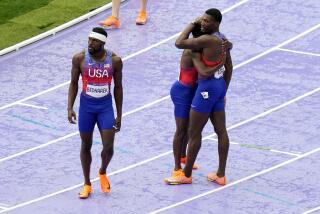‘Sled Dogs No Longer
- Share via
PARK CITY, Utah — The great U.S. men’s bobsled drought ended Saturday in a flood of medals.
The United States, which hadn’t produced an Olympic medal in this sport in 46 years, grabbed silver and bronze in the four-man event at Utah Olympic Park when drivers Todd Hays and Brian Shimer moved past Switzerland’s Martin Annen on their fourth and final runs.
A miracle on ice? Not quite, but it was close, at least when it came to Shimer, a seemingly washed-up 39-year-old whose virtuoso driving couldn’t offset his crew’s mediocre starts and who probably wouldn’t have tried for his fifth Olympic team if the Games hadn’t been on U.S. soil.
Germany’s Andre Lange won the gold medal in a total time of 3 minutes 7.51 seconds. Hays was second in 3:07.81, with Shimer third in 3:07.86. “It’s a fairy-tale ending,” said Shimer, who is retiring after 17 years in the sport. “I’ve dreamt of this my whole career.
“As far as I’m concerned, that bronze is as shiny as gold.”
Hays had a lead of 0.09 of a second after Friday’s two runs, but he raced first on soft ice in Saturday’s opening heat and finished in 47.22 seconds--the heat’s fourth-best time--and slid into third, 0.29 behind Lange and 0.02 behind Annen.
Shimer, who started the day in fifth place, 0.30 from a medal, had a strong 46.98 run to move into fourth, 0.15 behind Hays. In the fourth heat, as snow swirled, Shimer was the first of the top four to drive, followed by Hays, Annen and Lange. Shimer moved into first with a 47.23 run that would stand as the heat’s fastest.
But when Hays produced a 47.33 to move 0.05 ahead of Shimer, it looked as though the latter would barely miss a medal again. In 1998, Shimer missed a bronze medal by 0.02 after his sled mysteriously lost speed just before the finish. That capped a series of Olympic misadventures for Shimer that had started in the 1992 Games and included a four-man disqualification in 1994 for having runners that were too warm.
After 1998, two of Shimer’s push athletes, Garrett Hines and Randy Jones, left him for Hays, the new hot U.S. driver. Then a series of leg injuries made Shimer a non-factor on the 1999-2000 and 2000-01 World Cup circuits. When one of his top pushers injured his back in October, the former Morehead State football player seemed unlikely even to make a fifth Olympics. Shimer gambled by skipping five of the seven World Cup races to assemble a workable crew and prepare for the Olympic trials.
In last Sunday’s two-man competition, slow starts helped relegate him to a ninth-place finish, and he didn’t figure to do a lot better in the four-man event. Saturday he watched in wonder as Annen’s interval times made it possible that Hays and Shimer might wind up on the medal podium.
“I thought, ‘Oh my God, is it possible?’” said Shimer, who began his Olympic career as a push athlete in the 1988 Games. “I thought maybe I had passed out after the second run and was dreaming.”
He wasn’t. Annen, a cheese maker, finished his run in 47.49 to slide 0.09 behind Shimer and set off a tumultuous celebration, with the eight U.S. medal winners climbing on the walls of the track and each other. Lange’s final run clinched the gold, but that didn’t put a damper on the party.
“I can’t describe my emotions,” Shimer said.
Neither could Jones and Hines. Both had just missed on Shimer’s 1998 four-man team, and Hines had missed a bronze medal by 0.03 last Sunday on Hays’ two-man sled.
Saturday, they recorded the best Winter Olympic finishes ever by African American males.
“This makes up for just about everything,” Hines said.
Jones, whom Hays had to lure out of retirement after 1998, said he would have struggled to cope with another near miss.
“An 0.02 here, and I might have jumped off that tower,” he said, gesturing nearby. “But we broke that curse with silver and bronze.”
To win silver, Hays had to overcome the late-January suspension of push athlete Pavle Jovanovic, who failed a December drug test. He added Bill Schuffenhauer of nearby Ogden and still produced start times that were the fastest or second-fastest in all four runs.
“Losing in the two-man stings like nothing ever has,” Hays said. “But we took that pain and put it into preparation, and here we are.”
Shimer and his crew of Mike Kohn, Doug Sharp and Dan Steele had starts that ranked from ninth- to 17th best, but Shimer overcame it with his driving.
Shimer and Hays might not have overcome the drought without a boost from NASCAR driver Geoff Bodine.
Bodine noted the U.S. struggles in the 1992 Games and realized matters probably wouldn’t improve as long as U.S. drivers had to use second-rate European sleds that were the best they could get.
He began the USA Bobsled Project to build state-of-the-art sleds, seeding it with more than $100,000 of his own money.
*
(BEGIN TEXT OF INFOBOX)
Medal Mine
Americans won medals in four races on the 15-curves sled track at Bear Hollow.
Women’s Bobsled
Gold--Jill Bakken, Vonetta
Flowers
Men’s Four-Man Bobsled
Silver--Todd Hays, Bill
Schuffenhauer, Garrett Hines
and Randy Jones
Bronze--Brian Shimer, Doug
Sharp, Mike Kohn, Dan Steele
Men’s Skeleton
Gold--Jim Shea
Women’s Skeleton
Gold--Tristan Gale
Silver--Lea Ann Parsley
More to Read
Go beyond the scoreboard
Get the latest on L.A.'s teams in the daily Sports Report newsletter.
You may occasionally receive promotional content from the Los Angeles Times.






